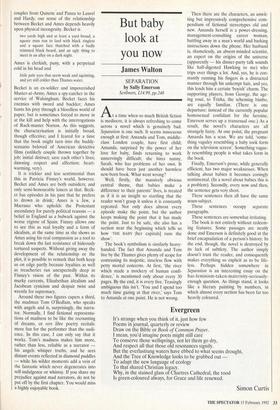But baby look at you now
James Walton
SEPARATION by Sally Emerson Scribners, £14.99, pp.248 At a time when so much British fiction is mediocre, it is always refreshing to come across a novel which is genuinely bad. Separation is one such. It seems innocuous enough at first: Amanda and Tom, middle- class London couple, have first child; Amanda, surprised by the power of her love for baby, finds returning to work unnervingly difficult; she hires nanny, Sarah, who has problems of her own. It should have been just another harmless new-born book. What went wrong?
Well, firstly, the massively obvious central theme, that babies make a difference to their parents' lives, is treated as if it is an insight so startling that the reader won't grasp it unless it is constantly repeated. Not only does almost every episode make the point, but the author keeps making the point that it has made the point. Just to be safe, she also has a section near the beginning which tells us how 'THE BABY [her capitals] runs the show'.
The book's symbolism is similarly heavy- handed. The fact that Amanda and Tom live by the Thames gives plenty of scope for contrasting its majestic, timeless flow with petty mortal concerns. At first, 'the river which made a mockery of human confi- dence,' is mentioned only about every 30 pages. By the end, it is every five. Teasingly ambiguous this isn't. `You and I spend too much time gazing at that river,' says Tom to Amanda at one point. He is not wrong. Then there are the characters, an unwit- ting but impressively comprehensive com- pendium of fictional stereotypes old and new. Amanda herself is a power-dressing, management-consulting career woman, battling away in a man's world and barking instructions down the phone. Her husband is, shamelessly, an absent-minded scientist, an expert on the origins of the universe (apparently — his dinner-party talk sounds like half-digested Hawking to me) who trips over things a lot. And, yes, he is con- stantly running his fingers in a distracted manner through his unkempt hair, and yes, this lends him a certain `boyish' charm. The supporting players, from George, the age- ing roué, to Trisha, the scheming bimbo, are equally familiar. (There is one departure: instead of the currently popular homosexual confidant for the heroine, Emerson serves up a transexual one.) As a result, the novel's characters are all strangely fuzzy. At one point, the pregnant Amanda has a scan. We are told, 'some- thing vaguley resembling a baby took form on the television screen'. Something vague- ly resembling people is what takes form in the book.
Finally, Emerson's prose, while generally efficient, has two major weaknesses. When talking about babies it becomes cooingly sentimental. (In a novel about babies this is a problem). Secondly, every now and then, the sentence gets very short.
These sentences then all have the same noun-subject.
These sentences occupy separate paragraphs.
These sentences are somewhat irritating.
The book is not entirely without redeem- ing features. Some passages are neatly done and Emerson is definitely good at the brief encapsulation of a person's history. In the end, though, the novel is destroyed by its lack of subtlety. The author simply doesn't trust the reader, and consequently makes everything so explicit as to be life- less. Perhaps hidden somewhere in
Separation is an interesting essay on the has-feminism-taken-maternity-seriously-
enough question. As things stand, it looks like a literary painting by numbers, in which almost every section has been far too heavily coloured.


























































 Previous page
Previous page